'If Indian armed forces entered Pakistan and succeeded in inflicting major damage on the Pakistani army and occupied territory in the Pakistani heartland, there is reason to think the Pakistani military would use some nuclear weapons against the incoming Indian forces to compel India to stop.'
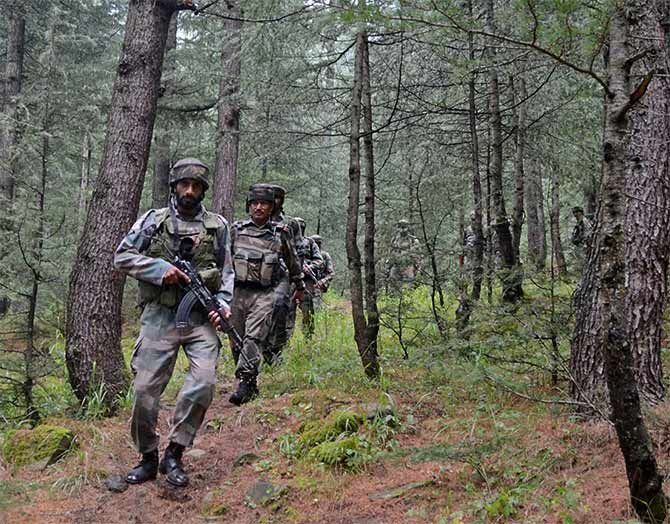
Testifying before the United States Senate Armed Services Committee Subcommittee on Strategic Forces on February 25 last year, Dr George Perkovich, arguably the world's leading expert on nuclear politics in South Asia, warned that a Pakistan-inspired terrorist attack in India could provoke an Indian military retaliation and in turn provoke a Pakistani nuclear response.
Barring a PTI dispatch from Washington, DC, Dr Perkovich's well argued warning (external link) largely went unnoticed in India.
The terrorist attack in Uri on Sunday, September 18, revived the possibility of an Indian military strike against terrorist camps across the Line of Control.
Would this incite the Pakistani army to draw its nuclear weapons? Will this, as American observers have long feared, lead to nuclear conflict in the sub-continent?
Rediff.com's Nikhil Lakshman asked Dr Perkovich -- vice-president for studies at the Carnegie Endowment for International Peace in Washington, DC, and the co-author (with Toby Dalton) of the recent book, Not War, Not Peace: Motivating Pakistan to Prevent Cross-Border Terrorism -- to explain the many complexities involved in military retaliation and possible nuclear conflict.
In your testimony to the Senate Armed Services Committee last year, you raised the possibility of a nuclear conflict if India responded militarily to Pakistan-inspired terrorism on its soil. What led you to this assertion?
The one thing nuclear weapons are good for is deterring adversaries from massively invading your territory or harming your people on a massive scale. They cannot credibly be used against anything other than large-scale threats.
If, after another terror attack on India, Indian armed forces entered into Pakistan and succeeded in inflicting major damage on the Pakistani army and occupied territory in the Pakistani heartland, there is reason to think the Pakistani military would use some nuclear weapons against the incoming Indian forces to compel India to stop.
Of course, Indian military officers and experts are aware of this possibility and seek to identify ways of defeating Pakistan below the threshold that would prompt Rawalpindi to use nuclear weapons.
In our new book -- Not War, Not Peace -- we analyse these possibilities. Basically, we conclude that anything that would harm the Pakistani military enough to compel it to give in to Indian demands and demobilise jihadi groups would also be severe enough to make Pakistan threaten the use of nuclear weapons. (It also needs to be explained how a badly damaged Pakistani military would be willing and able to take down the most potent militant anti-India groups).
Conversely, any Indian military action restrained enough to avoid real risks of escalation would be too weak to make the Pakistani security establishment abandon resort to violence against India, so long as Kashmir remains unresolved.
In your study, India's Nuclear Options and Escalation Dominance for the Carnegie Endowment, you point out that 'Pakistan's adoption of tactical nuclear weapons lowers the threshold for nuclear use, further complicating India's conventional and nuclear options to deter and, if conflict cannot be avoided, defeat its neigbour.'
Could you explain what led you to this conclusion?
As I mentioned, Pakistan is developing nuclear capabilities and plans to raise the costs of Indian incursion into Pakistan, in case the Pakistani army cannot stop Indian forces by conventional means.
Because in the premised scenarios, Indian forces would be on Pakistani territory, there is some credibility to the threat.
Further, India's stated nuclear doctrine is to respond massively to any Pakistani use of nuclear weapons.
If the Pakistan used nuclear weapons on a battlefield (and perhaps against Indian nuclear assets at air bases) and not immediately on Indian cities, India's threat to attack Pakistani cities is irrational and/or not credible. Especially insofar as enough Pakistani nuclear weapons could be secured from Indian strikes and would remain to retaliate against Indian cities.
So, in response to a terrorist attack, which, however outrageous, killed a relatively small number of people, if India sent significant forces into Pakistan and 'succeeded' to the point of motivating Pakistani leaders to detonate nuclear weapons to deter India from continuing, India would then be faced with the choice of stopping, or of retaliating in ways that could lead to the destruction of Indian cities.
Yes, Pakistani cities could be destroyed, too. But the exchange would hardly seem worthwhile for India.
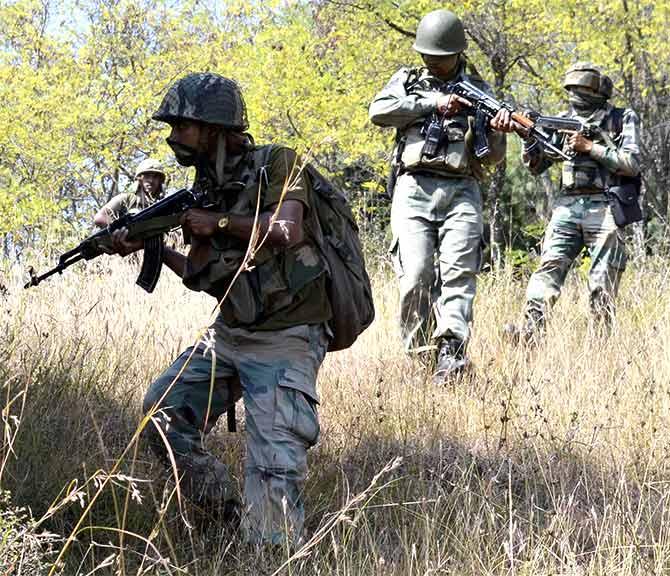
'If Indian forces were in the process of destroying the Pakistani military -- physically and/or politically within Pakistan -- Pakistani military leaders could feel they have relatively little to lose by using nuclear weapons,' says Dr Perkovich.
Do you believe the Pakistan army would actually use nuclear weapons if India went to war, risking both devastation and worldwide opprobrium?
Yes, if Indian forces were in the process of destroying the Pakistani military -- physically and/or politically within Pakistan -- Pakistani military leaders could feel they have relatively little to lose.
As I suggested, their first uses of nuclear weapons could be designed to avoid targeting cities, shifting the burden of escalation to India, giving the Pakistanis some reason to believe/hope that the tactic would stop the war and not destroy either Pakistan or India.
This may be a wild gamble, but if you feel that you are about to die anyway…..
Speaking on television the other night, a former high commissioner to Pakistan dismissed the Pakistan threat of using nuclear weapons against India as 'mere bluster.'
He felt Pakistan's generals would not risk disrupting their cosy, comfortable world by doing something foolhardy like initiating nuclear warfare.
I hope he is right, but am not convinced he is. It depends on the scenario, as I tried to describe earlier. If India successfully fought through Pakistani defences (a big question) and threatened the Pakistani army’s physical and/or political survival, I believe they would use some small number of nuclear weapons to motivate India to stop.
By the way, this was US strategy -- more or less -- during the Cold War and Russia's and North Korea's strategy today. It may be crazy or a bluff, but is it a bluff India would be sane to call?
There have been concerns about the dramatic increase in Pakistan's nuclear arsenal in recent years. Could this increase, in your opinion, be linked to the deterrent factor, to prevent an Indian military retaliation?
How many nuclear warheads do you believe Pakistan has? Have you been alarmed by the increase in nuclear warheads?
Pakistan has steadily increased the size of its nuclear arsenal. There are several reasons for this, including institutional momentum.
One reason is the basic view that Pakistan must compete with and deter an India that will continue to grow stronger every year thanks to the growth of its already much larger economy and thanks to conventional and other weapons it can afford to import from the US, France, Israel, etc.
The Pakistani military feels it needs to build nuclear forces to keep up with the combination of India's conventional and nuclear capabilities as these capabilities will grow over the next 30 years.
This is not crazy, but it does raise lots of worries about things that could go wrong.
Is Pakistan, in your opinion, the most dangerous nuclear power in the world?
How real are the fears that nuclear weapons could easily fall in the hands of the country's many terror groups?
It's hard to rank nuclear powers in terms of danger, and different people around the world would rank them differently. I think most would say North Korea is most dangerous.
Many would say that today Russia is quite dangerous. Pakistan would be somewhere around Russia, due to the Pakistani security establishment's unwillingness to demobilise groups that conduct cross-border terrorism.
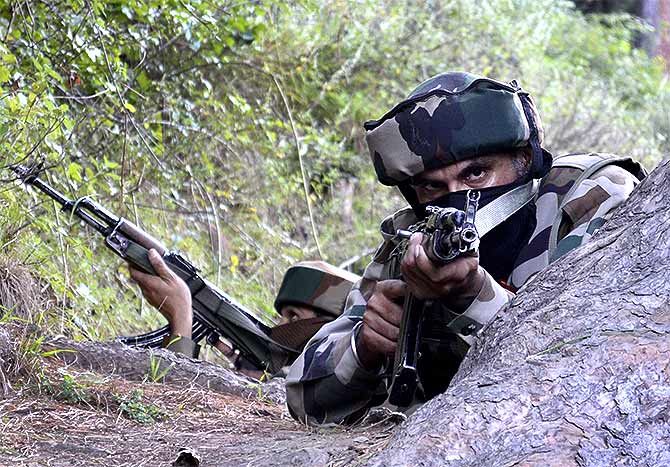
'One of the consequences of nuclear deterrence,' says Dr Perkovich, 'is that it limits each side's options for fighting the other.'
Do you believe nuclear parity between the two neighbours and the fear of atomic conflict has kept the peace in South Asia since Kargil?
What would it take to disrupt the equilibrium?
Would Sunday's attack in Uri qualify as the tipping point for India?
I think that mutual nuclear deterrence has made leaders on both sides conclude that major warfare between the two States would be suicidal.
To that extent, nuclear weapons have been stabilising. But beneath the threshold of major warfare, Pakistan has still conducted/facilitated/tolerated terrorism against India.
India may increasingly be tempted to do the same to Pakistan.
This low-intensity conflict can escalate, which is why we write in our book of an 'unstable equilibrium.'
I should not make a prediction, but I don't think Uri will cause India to undertake a major military action that would be destabilising.
Among other reasons, as outrageous as the attack was, it was against a military installation in Kashmir, not a civilian target in the heartland. The camp should have been better protected, etc.
So, for India to react disproportionately would be to invite further damage that would be much greater than that which occurred on Sunday.
In your interactions with Indian strategic thinkers and military leaders, do you detect a sense of helplessness that they are unable to punish Pakistan's Deep State for fomenting terror because of the nuclear threat?
Not helplessness, but deep frustration. And this is understandable.
But one of the consequences of nuclear deterrence is that it limits each side's options for fighting the other.
While the good news is that this may reduce risks of major warfare, the bad news is that it increases temptations to inflict harm on a lower scale.
This dynamic is difficult, perhaps impossible, to escape.
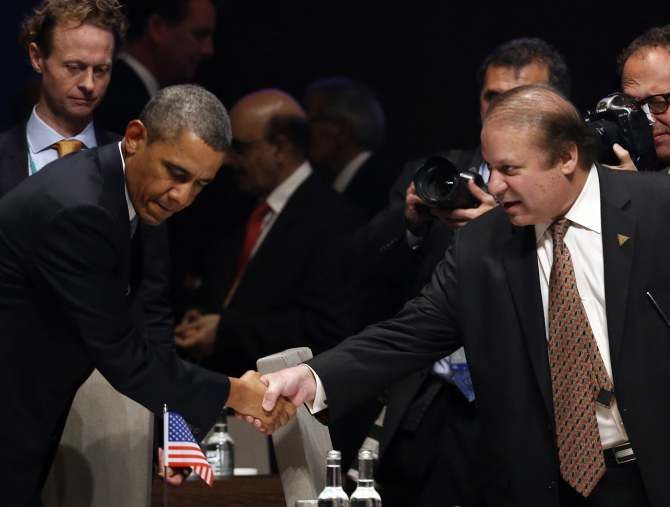
'Rather than immediately winning international support for declaring Pakistan a State-sponsor of terrorism,' Dr Perkovich says, 'it might be more advisable to continue developing India's larger strategy for diplomatically and economically isolating Pakistan.'
Some American strategic thinkers have advocated diplomacy as a solution -- 'A better approach would be to seek diplomatic support for labeling Pakistan a patron State sponsor of terrorism,' one eminence suggested to Rediff.com on Monday.
But will that be enough to satisfy the calls for retribution in India?
Political leaders have extremely difficult jobs in situations like these. The media and Opposition political parties have great incentives to inflame passions and accuse you of weakness -- it makes good television drama and political theatre.
But leaders have a deep responsibility for the lives of their soldiers and people, and for the economic well-being on which progress depends, etc.
Leaders also have a better sense of possible risks and trade-offs in potential uses of force.
Diplomatic isolation of Pakistan, including by having it recognised as a State-sponsor of terrorism, may not satisfy the crowd, but it will deeply affront Pakistan and add leverage against it, and will come with none of the risks that war could bring.
What the US did after 9/11 is a good example of what not to do, though the military campaigns in Afghanistan and Iraq were popular for awhile.
Look at Afghanistan today, and how Americans regard that experience.
Look at Iraq, and the emergence of ISIL/ISIS...
The situation between India and Pakistan obviously is different in many ways, but the general point is that it is worthwhile to look for more clever and less volatile ways to punish supporters of terrorism than the ways that might satisfy the crowd.
Military action that might satisfy public opinion on the first day can lead to consequences weeks later that will make the crowd turn on the leaders that they at first cheered.
And how realistic is that objective, given the fact that both America and China would be unwilling to isolate Pakistan, given their interests in that country?
As I mentioned, the fact that the attack at Uri and earlier Pathankot were against military installations complicates the international effort to condemn Pakistan.
Here I'm assuming that credible evidence will be produced to tie the attackers somehow to Pakistan; otherwise the challenge is even greater.
It's complicated still further by the tensions and violence in the Kashmir valley that preceded the attack and that most observers understand to be rooted in indigenous factors, not the 'Pakistani hand.'
Nevertheless, both China and the US have major interests in stability between India and Pakistan and in countering terrorism.
Rather than immediately winning international support for declaring Pakistan a State-sponsor of terrorism, with all the complications this entails, it might be more advisable to continue developing India's larger strategy for diplomatically and economically isolating Pakistan for its inadequate fulfillment of counter-terrorism obligations under UN Resolutions.
The Uri attack can be added to the list of particulars in a broader campaign.
In our book, for example, we ask whether brilliant Indian economists, social media experts and others -- in Indian and global consulting firms and other enterprises -- could not be commissioned to design political, economic, and social strategies that could threaten the economic and social interests of entities controlled by current and former Pakistani military leaders. This could be done in parallel to direct outreach to governments.
It would take time, and would not satisfy immediate desires for revenge, but there is no quick solution to the problems Pakistan poses in any case.
Even if somehow India could devastate the Pakistani military without causing escalatory warfare that would also hurt India, the question would still remain whether and how that would end the activities of militants who target India.
India seems to have very limited military and diplomatic options to deal with terrorism on its territory, which is why there is a feeling of helplessness. How can India resolve this dilemma?
I've tried to suggest some of the considerations surrounding various options. Here I would add that India is not alone in facing such challenges. Israel, the US, now European States, and others face chronic threats from terrorism. Everyone feels rather helpless against this.
In India's case (as arguably with Israel and the Palestinians) there is probably no solution that excludes some sort of political accommodation with representatives of significant elements of the Kashmiri Muslim population and, frustratingly, with Pakistan.
Terrorism is too easy to do and too hard to stop, in the absence of broader political processes to satisfy enough people that they will turn on those who conduct terrorism in their name.
I say this recogniSing that there are elements within the Pakistani Deep State and the militant groups who will act violently in order to disrupt political resolution because their identity and economic interests depend on conflict.
Perhaps the most that can be done is to limit the threat and contain risks of escalation. Again, this is not satisfying, but it's not clear what the better alternatives are.
 In your article in Seminar some years ago, you made this point: 'I believe that the prominence and power of the Pakistani Army, intelligence services and jihadis will not diminish as long as the prominence and power of the Hindutva agenda are rising in India. These two internal dynamics are related; they feed on each other.'
In your article in Seminar some years ago, you made this point: 'I believe that the prominence and power of the Pakistani Army, intelligence services and jihadis will not diminish as long as the prominence and power of the Hindutva agenda are rising in India. These two internal dynamics are related; they feed on each other.'
'Pakistanis cite the RSS and VHP as proof that Hindus are out to destroy Muslims and, of course, Pakistan.'
' The RSS and VHP, of course, use the prominence of Islamist parties and terrorist organisations in Pakistan as proof that Muslims are evil.'
'My point is simply that pursuit of the Hindutva agenda will only tighten the handcuffs, the hyphen, that connects Pakistan to India.'
'The only way for India to liberate itself from Pakistan is through pluralist liberalism, not cultural nationalism.'
Could you please explain how you arrived at this conclusion?
Indians are well aware how violent jihadi ideology intensifies the feeling of threat from Pakistan and makes people seek forceful ways to root out the bad guys and punish Pakistan.
In Pakistan, one hears even quite liberal, sophisticated people say that the RSS and VHP agendas are inherently threatening to Muslims, and indeed is why the formation of Pakistan was necessary.
I have heard this alot in the past two years. When leaders emerge who appear strong and forceful -- whether in India or in the Pakistani military -- people naturally feel that such leaders must be confronted and shown that they cannot succeed in bullying the other side into submission.
'If we give in, they will only keep pushing for more.' This is a central Indian argument toward the Pakistani military and jihadis; it is also an argument that some in the Pakistani military and militant forces make toward the proponents of Hindutva.
The two forces then fuel each other. It's hard to see that either can 'win' without enormous sacrifices of their people.
Pakistan, in particular, has suffered the violence from forces that were first cultivated to harm India.
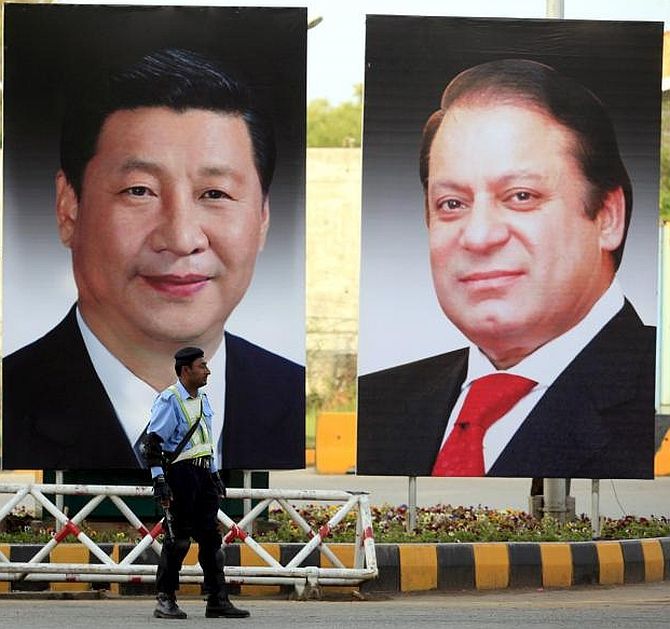
'In past crises with India,' Dr Perkovich explains 'China has not done all or even much of what Pakistani leaders wished.'
In April last year, a retired general writing on Rediff.com noted Pakistan's swagger and warned that 'Pakistan may feel emboldened to give an upswing to the proxy war in J&K, having secured a better international consensus on its strategic importance.'
What is the source of Pakistan's swagger? Does it come from its belief that it is too valuable for the United States to alienate it?
Does it come from President Xi Jinping's desire to create Pakistan as a linchpin in China's future economic and strategic plans?
I don't sense a genuine feeling of confidence or swagger in Pakistan. Quite the contrary. The country is experiencing all sorts of difficulties -- in Balochistan, Karachi, Punjab, KP (Khyber Pakhtunkhwa), in economics, in dysfunctional politics.
The internal security situation was horrible for years, though maybe somewhat better in recent times.
All in all, though, I don't find many Pakistanis who are optimistic about the future of Pakistan as a secure, developing, modern country.
There is a marked contrast with the atmosphere in much of India.
Nor do I see evidence that Pakistanis rely on or trust the US. If anything, it's the opposite of reliance and trust, especially as the US is seen to strongly favour India.
Regarding China, the feeling is more mixed. At the State level there is some confidence that China can be relied upon to buttress Pakistan and perhaps to help build infrastructure, etc. But among businesspeople and others there is a lot of scepticism. There is little social or cultural or emotional attachment between the two countries and societies.
China is perceived to single-mindedly seek its own narrow interests. It does not, for example, contribute funding for health, education and other forms of development in Pakistan.
In past crises with India, China has not done all or even much of what Pakistani leaders wished.
China has a great interest in stability and preventing terrorism, even as it also sees value in using Pakistan to divert India's attention and strength.
None of this, in my experience, emboldens Pakistanis to feel that somehow China will underwrite or protect Pakistan.
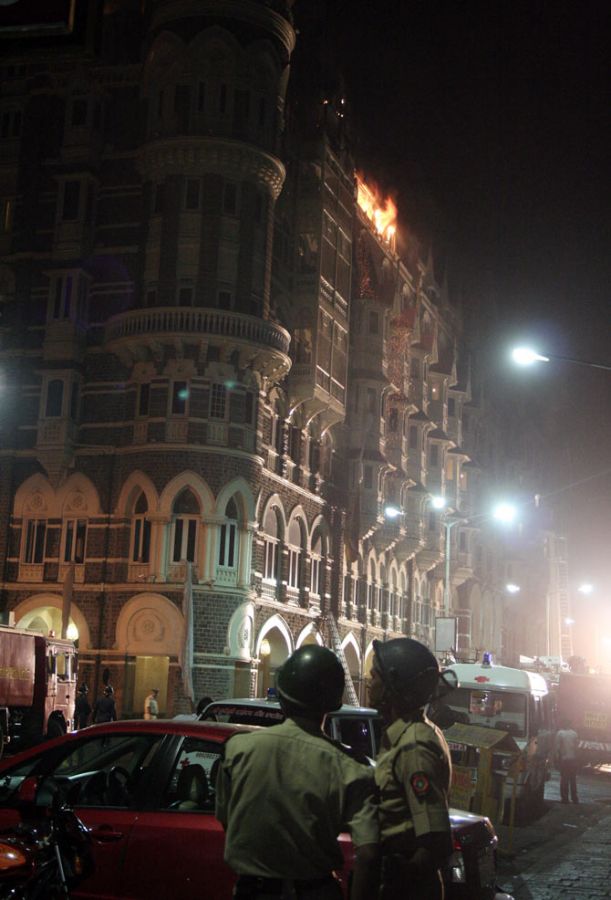
'I believe the Pakistani establishment realised that the Mumbai attacks ultimately harmed Pakistan's interests. This is one reason that attacks in Pathankot and Uri were directed at military installations and not civilians.'
Finally, how do you see the next few months play out in South Asia? How close are we to war? How close are we to a possible nuclear conflict?
So-called experts should be prepared to make predictions, but events almost always turn out differently than they predict. So I should avoid this question.
But, if I had to guess, I would say that the leaders of India and Pakistan understand that they have more to lose than to gain by military conflict.
They both have interests in avoiding escalation, in part due to the shadow of potential nuclear war if escalation did occur.
I believe, but certainly cannot prove, that the Pakistani establishment realised that the Mumbai attacks ultimately harmed Pakistan's interests.
This is one reason, I speculate, that attacks in Pathankot and Uri were directed at military installations and not civilians.
Whether or not, the Pakistani authorities directed or knew about these attacks, whoever conducted them chose targets that would be less likely to outrage the world, cause large-scale Indian military reactions, and offend the decency of educated Pakistanis -- all of which would undermine Pakistan's interests.
I believe Indian leaders will make similar calculations as they consider how to respond, in order to keep what is a painful-but-manageable chronic problem from leading to much more damaging conflict.









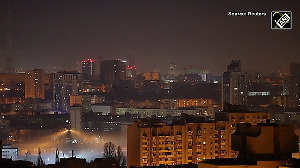

 © 2025
© 2025